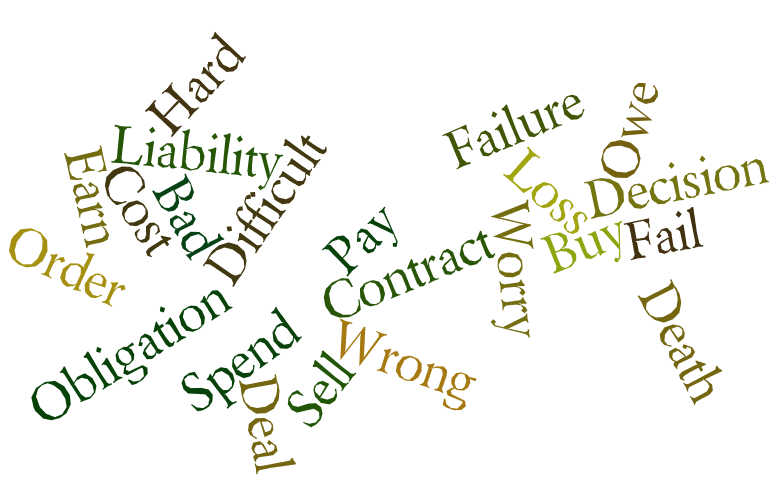November 2012
We hear so many stories of risks paying off that we’re in danger of thinking that the greater the risk, the greater the reward. But if that were so most gamblers would leave Las Vegas with more than when they arrived.
Psychology Of Risk Assessment
Human beings are not computers. We tend to assess risks less accurately than what you would get from a simple set of rules.
We often pay more attention to anecdotes and memories of risks succeeding or failing than to rational analysis. If we vividly remember risk leading to disaster we are more likely to refuse risks we should take. If we vividly remember risk paying off we are more likely to take risks we should refuse.
The best way is to assess risks with a rational balance between risk and reward. How likely is failure or success? What harm or benefit would result?
This might seem to dull and actuarial for those of us who thrill to the stories of the great captains of war and industry. What would General Patton think of us?
Calculated Risk In War
Patton and Tanks
Was General George S. Patton a rash risk-taker? That was his reputation while fighting World War II.
His superiors kept holding him back, partly because they thought he was too rash. But was he really?
Military historians agree that his ideas were right. He could have ended the war earlier if fully unleashed. So was he making lucky guesses?
No. Despite his rash, rough, aggressive image, he was an experienced and expert military man. During World War I he founded a tank school for the Americans and used tanks in combat. As of World War II he was one of the world’s leading tank experts. His correct calculation was that with reconnaissance and combat support from the air, his tanks were at little risk from being flanked.
So aggressive advances were the right way to go.
He was not a wild risk-taker. He was a calculated risk-taker.
Sherman and the March to the Sea
The same goes for William Tecumseh Sherman’s famous March to the Sea. Sherman led his army away from its normal sources of reinforcement and supply and marched away into Georgia.
Would southern armies, fighting for their home ground, have a great advantage in morale and knowledge of the terrain? Unable to get reinforcements during the march, would his army shrink excessively from disease and combat losses? Above all, would his army starve?
Both President Lincoln and General Grant had serious doubts about Sherman’s plan. President Lincoln later wrote to Sherman:
When you were leaving Atlanta for the Atlantic coast, I was anxious, if not fearful; but feeling that you were the better judge, and remembering that ‘nothing risked, nothing gained’ I did not interfere. Now, the undertaking being a success, the honour is all yours; for I believe none of us went farther than to acquiesce.
So was Sherman just a lucky gambler? No.
He knew that the march would help greatly in ending the war, if it succeeded.
As for the chances of success, from having lived in the south and his diligent study of southern agriculture, he knew his army could forage enough to support itself on the march. He also helped his chances by keeping the enemy in doubt about his immediate goals.
His radical move was a carefully calculated risk.
Calculated Risk In Business
Despite books pushing the analogy between them, business is very different from war. Still, the history of risk in war suggests points to consider for business risk:
- How big is the potential gain?
- How big is the potential loss?
- Would the possible loss be manageable, or fatal?
- Is the risk really necessary?
- What is the risk of not taking the risk?
- Is there a safer way? A cheaper way? A better way?
- Have you considered that you never know everything?
- Are the necessary people and resources available?
- Would your people understand the plan, and follow it?
- Have the chances of success been rationally calculated or is it based on feelings? Greed, ego, and optimism can lead you astray.
With a carefully calculated balance of risk and reward the business or the military has a better chance to win, and win big. Then the media will talk up the risks taken and downplay the calculations that led to victory.
Forget the eye of newt. Put your black cat up for adoption. The wise know that the real magic is in words.
Not just any words — the right words.
At least, that is what I gather from copywriter Sarah Jo Wood of Evolving Advisors Inc. in Toronto, Ontario. She was kind enough to send me a list of words to avoid. Apparently, readers who see these words run screaming into the night, or at least shudder and turn away.
Here are the words of woe that she says can jinx your writing:
See how I can use those words, underlining them as I go:
As a business and trial lawyer writing on business and law, it is hard to see how I can meet my obligation to my readers without using those “wrong” words. Suppose I want to analyze a difficult decision to sign a contract to buy or sell in order to earn. I must consider what may worry the business person more than death — failure. A business deal gone bad can cost money; what you owe you usually must pay. There are ways to lower the risk of liability and loss, but worry is a cost of doing business. If you spend your life in a fantasy you should expect to fail.
Maybe that paragraph sounds negative, but could I say those things without most of those words?
That said, Sarah does have a point. Words have more than their literal meaning. They have associations and implications, mood and tone. They pick things up from the company they keep like butter can pick up tastes in a refrigerator.
Mark Twain famously said, “The difference between the right word and the almost right word is the difference between lightning and a lightning bug.”
I have to admit that looks nothing like a bug of any kind.
In advertisements people never “spend,” they “invest.” Of course, vacation trips and other luxuries are consumption, not investment, but the advertisers use the more appealing word anyway. I suspect they know what they are doing.
Suppose you want to influence your audience’s attitude towards a man. There are many ways you could accurately refer to him. Depending on your audience and what attitude you want, you could call him the biker, the Harley rider, the motorcyclist, Dr. Maniple, the pediatrician, the doctor, the baby doctor, and so on.
For an average middle-class audience the words from “Dr. Maniple” are more positive than “biker” or “Harley rider.” The word “pediatrician” could come across as stuffy, pretentious, or confusing to some audiences but clear and appealing to medical people. Those who have had good dealings with Harley-Davidson motorcyclists might find “Harley rider” very positive.
These differences can matter in court, in novels, in advertising, in fact in any communication.
Even synonyms do not mean exactly the same thing. For example, someone who is “prosperous” probably does not have as much as someone who is “wealthy.” Haute cuisine is not described as “yummy.” A “lovely” woman is more refined than a “hottie.”
Consider word choice and business names.
“Ben & Jerry’s” seems friendlier and less corporate than “A Division of Unilever.” Ben & Jerry’s now actually is a division of Unilever but does not sell Unilever ice cream. It just would not sound as good as Ben & Jerry’s.
What about a string-of-initials name? The idea is that since IBM is a famous corporate giant your small business startup will impress with a name like RKZZP Corp. But such a name can make your branding efforts harder. Who can even remember “RKZZP Corp.”?
The string-of-initials name does not make the famous corporate giant impressive; the fact of being a famous corporate giant lets it get away with using a dud name.
Word choice matters but it is not all that matters. Shakespeare, the great master of word choice, wrote “a rose by any other name would smell as sweet”. I would add, an “unauthorized effluent release” would smell as bad.
But put the right words with the right substance, and now you have magic.




